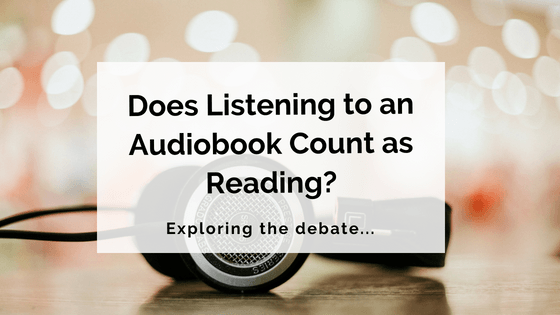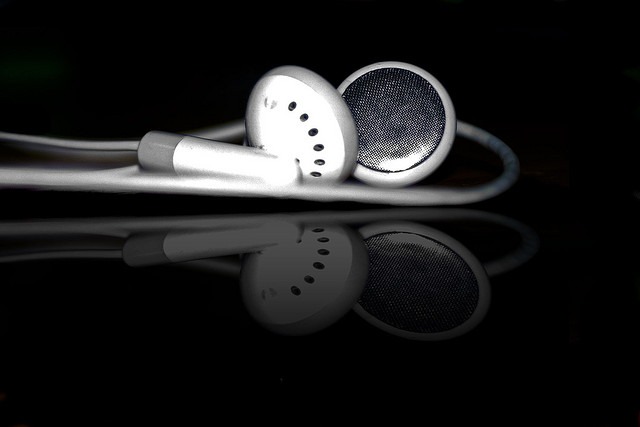One debate that’s been dividing the reading community for the last few years is the question of whether listening to an audiobook counts as reading.
There has been an abundance of new technologies infiltrating the publishing industry in recent times, and with these technologies have come controversy and debate surrounding their impact on the way we read.

So is listening to an audiobook the same as reading from the page? We explore the arguments and discussions surrounding the subject…
Recent estimates suggest that audiobooks are a two billion dollar industry, and growing every year.
A sales comparison carried out by the Audio Publishers Association in 2014 showed that almost double the amount of audiobooks were sold in the first half of 2014 compared with the same period in the previous year.
In addition to this, the industry has reached the point where books are being written specifically for the audio format.
Given the size and reach of audiobooks, it’s no wonder the question of their reading legitimacy has become a hot topic.

Background
According to the Macquarie dictionary, the act of reading occurs when you “observe, and apprehend the meaning of (something written, printed etc)”.
So, where does this leave audiobooks?
If you listened to Jane Eyre, are you not allowed to claim to have read it? And should you be ashamed of the way you consumed it?
The extreme audiobook detractors believe the answer to the last question is an emphatic yes.
In these camps, listening to audiobooks has been described as anything from lazy to outright cheating.
As Psychology Professor, William Irwin, said in his article Reading Audio Books, “Audio books began as a boon to the blind and dyslexic and have been mistaken as a refuge for the illiterate and lazy.”
The voices of the other side, however, claim that the method of consumption has little or no relevance – the words are the same no matter how they are being delivered.
The arguments from both sides of the debate range from the scientific to the subjective; the only similarity is the passion behind their beliefs.
The Science

While there is not a great deal of scientific research into this specific issue, there are a few relevant studies that present cases for both sides.
As far back as 1977, a study was conducted at the University of Chicago, in which participants were asked to write a brief summary of a story after either listening to it or reading it.
The content of the summaries produced by the participants were extremely similar, suggesting that the processes involved in reading and listening, as well as the end results from these activities, were very similar.
The authors stated that, on the basis of their findings, “reading and listening involve identical comprehension skills”.
In contrast, in 2013, psychologists at The University of Waterloo, Ontario conducted experiments into mind wandering, interest and memory when reading silently, reading aloud and listening.
Using excepts from Bill Bryson’s A Short History of Nearly Everything, participants read one section aloud, read another section silently and listened to a third section while looking at a blank screen.
The results showed that when listening, the participants’ minds wandered the most, and they remembered the least.
The study presents the idea that “a more physically engaged reading experience means readers are likely to spend less time mind wandering”.
The authors also noted that “while listening to an audiobook or podcast may seem to be a convenient and appealing option, our findings suggest that it might be the least beneficial to learning, leading to both higher rates of mind wandering and less interest in the material.”
It’s possible that this study even underplays the mind-wandering aspect of audiobooks, seeing as it would be rare for someone to be staring at a blank screen when listening to a book.
The majority of people listen to audiobooks while doing other things, such as driving, exercising or cleaning. This kind of multi-tasking is almost impossible when reading a physical book, and is one of the most common arguments against audiobooks.
While there is science to back up both sides of the argument, the real debate is raging in the reading trenches: blogs, book clubs and other such reading communities, and these arguments are made up of a great deal of personal and subjective opinions.
The Not-so Scientific
One of the main arguments against audiobooks as a legitimate form of reading is that by having someone else read you the book, you may be influenced or guided into certain assumptions based on their tone or expression.
In other words, the narrator interprets the text and passes these impressions onto the reader, thus excluding the reader from ever needing to form their own impressions.
While this definitely takes away an important element of the reading process, in some cases, this may actually enhance the reader’s enjoyment and understanding.
(Personally, I would have loved this when I was reading The Sound and The Fury – maybe then I would have understood what on earth was going on.)
As mentioned previously, another significant issue that gets raised is the fact that people find it hard to focus when they are listening to a book – they feel they are much more easily distracted than they would be if they were reading a physical book.
While this is a legitimate concern, it isn’t a valid argument in the current debate. People’s personal preferences and/or abilities are just that, they’re personal, and are not legitimate reasons to exclude an entire method from the reading umbrella.
The most obvious argument in favour of audiobooks’ legitimacy is that the content is exactly the same regardless of whether the words are being listened to or read.
A listener experiences the same story as a reader, they should be just as able to contribute to a discussion about the book, and have as much of a legitimate claim to having read it.
The Verdict

To say that listening to a book means you haven’t read it, excludes all visually impaired people from being able to call themselves a reader, which seems extremely unfair.
Reading is, at its heart, an inclusive activity and community – to exclude such a large population for what is essentially semantics seems a little out of character.
This is not to say that audiobooks are for everyone, in the same way that e-readers aren’t for everyone.
But the fact that the method doesn’t suit everyone’s reading style shouldn’t exclude it from the reading family.
We all accept the fact that everyone is different; there’s no reason why this fact should be any less accepted when it comes to the way we choose to read.
While the processes of listening and reading are different, the end results are similar enough; listeners should neither feel ashamed nor defensive about their method.
As I see it, we have two options – either we accept that technologies are changing the way we read and expand the definition of reading to fit the times, or we create a new word that encompasses all forms of literature consumption.
Either way, carry on reading, listeners.
Click here to learn more about the reading process!
13 responses to “Does Listening to an Audiobook Count As Reading?”
Personally I don’t think it’s lazy to listen to a book. I have heard of people exercising while listening to them. Technically if you think about it you don’t usually get exercise when you read a book. I’m not going to run into something or walk around when reading. I am the type of person that usually reads books. I have never listened to a book before, but I don’t think it’s lazy or cheating to do it.
I don’t think the question is whether listening and reading are valid and profitable ways to experience books or gain information. The question is whether reading and listening are distinct activities and whether the distinction between those activities should continue to be recognized or not. Is it okay to conflate the meaning of the terms “read” and “listen” so that there is no longer a recognizable distinction between the two words? In my view, I would like the two words to remain separate and to be used appropriately. If I send my child to school, I want to know whether and how well he can “read.” I do not want my child to report to me that he has “read” a book that he has “listened” to the teacher read aloud. Audio books are valid ways to enjoy stories, just as printed books, movies, and plays are valid. Nobody should feel “ashamed” because they enjoy different forms of media. That’s ridiculous. But for the language’s sake and for the sake of clear comprehension, “read” and “listen” should remain distinct words and should refer to distinct activities.
Hi there,
Totally agree with all your thoughts here! I personally think reading a book and listening to an audiobook should always be considered distinctly separate activities, but absolutely agree that listening to an audiobook is no less of a valid way to consume literature.
Thanks for chiming in! 🙂
-Claire
I completely agree with your opinion — very well stated. I would like to add that reading helps an individual become more critical thinkers since reading allows the reader to pause and look up words and phrases they don’t understand. If you are an avid reader with a great vocabulary then audiobooks are a great choice but if you’re not, then audio books may just dumb you down because reading is a way to learn and build up your vocabulary.
It’s certainly going to make life for HS English teachers more difficult as more and more books are easily downloaded as a recording. How do you know whether a book report was listened to or physically read? Not quite as easy as the old “I watched the movie”, which almost always had obvious differences. I suppose the good news is at least an audio book makes you invest a fair amount of time into it, but certainly you aren’t practicing physical reading when you listen.
It depends on the text. The best example I can think of is David Sedaris’s “Santaland Diaries.” Someone gave me a small copy of that book as a Christmas stocking stuffer (a loooong time ago), and I thought it was funny. When I finally heard a broadcast of Sedaris narrating the story in his own voice, it completely changed the experience – like it became 3-D.
With other books, my own personal ideas of what the book means & what it’s about are more important. I’m thinking books like 1984, or To Kill a Mockingbird. I wouldn’t want to experience those books in any other way than holding them in my hands, carrying them around with me, and taking them in. For these kinds of texts, another person’s voice can actually annoy me.
Personally, my mind wanders just as much when I’m reading vs. listening. I’m not convinced by the Waterloo study where partici[ants stared at a blank screen … who does that? Reading and listening are both receptive skills that can be continually developed. Assuming you have acquired basic literacy, I think they’re both valuable
Hi Kiki,
It’s amazing how listening to an audiobook can change the entire experience for some books, isn’t it? And totally agree that both reading and listening skills are both highly valuable.
Thanks for sharing your thoughts!
-Claire
I do enjoy sitting down with a good book in my hands and reading it. But I think for people who lead busy lives, audiobooks are a way to feed the need to read when there isn’t time to sit quietly.
I worked as an aircraft mechanic for 15 years – most recently installing interiors in Boeing 737’s. I LOVE learning new things, but once I became proficient at my jobs, I missed the mental stimulation, and the days became long.
I am also an introvert, and in a busy industrial situation, the intense nature of the work coupled with people talking could be overwhelming.
Audiobooks were my refuge from the noisy world. I consumed books at a voracious rate – even with shutting them off during the times I was required to concentrate on a task. They kept me sane and fed me intellectually at the same time.
In my retirement, I’m writing more than reading, but I still indulge myself with a good audiobook as often as I can! I believe listening and reading – while separate activities – still equate where books are concerned.
Hi WendyGael,
Thanks so much for your comment! What a great way to use audiobooks – it’s wonderful to hear about people who are able to use audiobooks to consume many more stories than they would otherwise be able to in their busy lives. Sounds like it was the perfect solution to your situation at work, and we’re glad to hear you’ve continued to enjoy audiobooks after retiring!
Happy writing, reading and listening 🙂
Claire
Personnally , I think listening to audiobooks INSTEAD of reading is… Just sad. Good only to illiterates IMHO.
I find audiobooks to be very calming and relaxing as I don’t have to focus my attention on the pages but take in the story being read to me. So, strictly speaking, audiobooks aren’t ‘reading’ as they aren’t using your eyes to consume information but they still help you to consume it with your ears. I my honest opinion, if it all ends up in the same place (the brain/imagination) then they can be classified as equal.
When I read a book, I imagine in my mind what is going on as I read it.
Later when I remember back to what I just read I remember the images and experiences in my mind and imagination and the thoughts I had, not The words on a page.
THIS is what actual reading is like.
Listening to Audio books is boring in comparison, they are in now way the “same”
As a voracious audiobook consumer and slightly less voracious reader of text I’ve wondered how to talk about and classify those experiences. I think there are times when distinguishing them explicitly is helpful, and there are times when it is emphatically not.
I think it’s clear that reading-with-one’s-eyes without an audio component is the more difficult and consuming task, but that doesn’t make it inherently better, and doing it doesn’t make the readers morally superior. Humans evolved to communicate with spoken language, and it’s only been the past few thousand years that we have even been able to record stories in writing. Committing language to paper actually loses part of the content– humans use tone, rhythm, voicing, nonverbal sounds (not to mention body language) to convey all kinds of information, and the reader is obliged to resupply those elements because they simply can’t be translated into our written language. That is the first hurdle to the visual consumption of language. We are forced to slow down and to work our brains a little harder to get that inferred information. And that extra work and engagement is more likely to keep us thinking critically about the text. That is not an objectively better way to take in information; it is a better tool to help yourself to remember the content, but it is not a better way to absorb the language or the flow of the words. It is also worth remembering that some people learn better through auditory input, and others through visual processes. Just because you learn it better on paper doesn’t mean everyone does.
If the point, as one commenter indicated, is to teach kids how to read (words) and to read deeply and critically, then OF COURSE you should sit them down with the text. You should make sure they are literate and know spelling and punctuation and literary devices, and that’s all about the written aspect of literature. That is when it is important to distinguish between visual and auditory consumption. A good teacher would also make sure the students get a healthy dose of audio, as well, because it will help reinforce what they’re learning and give them a new perspective. (Imagine never having heard a reasonable interpretation of Shakespeare, and instead be poring over the text trying to pound out the rhythm in your own contemporary dialect and accent.) Likewise, if you’re in a book club where the point is to read closely and discuss, you should probably do your fellow book clubbers the courtesy of concentrating on the story, which may be better done with the text.
Some books are very dense intellectual works that demand a close reading. One might argue that readers will get more out of closely reading them, or are wasting their time trying to get the gist. But many books are just there to be entertaining or to evoke a certain emotional resonance, or the language is simple and clear, or the author would be happy if the readers do come away with just the gist.
I like to listen to audiobooks whenever I have to deal with a multitask-able task– cleaning house, folding laundry, doing dishes, cooking, darning clothes, yard work, driving long distances, and even occasionally some aspects of my work. I acknowledge that this is not the optimum way to process and consider every word of the book, but I’m not in English class. I do not feel beholden to the author to self-consciously contemplate the beauty of every phrase and the deeper symbolism of the imagery. Most of what I read is for my own entertainment and sometimes to learn about something, not for research (though I do plenty of that, too, in text form). If I ran a book blog where my reviews were meant to be well-considered think pieces you bet I’d be taking notes, but that just isn’t reality for me or for most people. Nonetheless, I routinely listen to the entire story, and if I tune out for a second I’ll back it up so I comprehend the meaning and continue to follow the story. I think having the audiobook option is the best of all worlds: I can comprehend and digest it easily, I’m entertained/engaged, AND I can get some of those never-ending mindless chores done while I read– a much better use of time than watching TV, wouldn’t you say? For the vast majority of these books I’d venture to guess that my comprehension and retention is about what anyone would expect for the book and the genre, so why does it matter whether it was heard or seen? I read 105 books last year (first year I started tracking with Goodreads). Most were audiobooks, and most of them weren’t that memorable. Some were, and I do remember them. I even took notes on them. I may even go back in for a closer read.